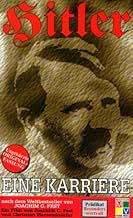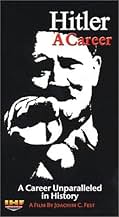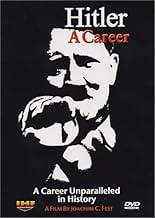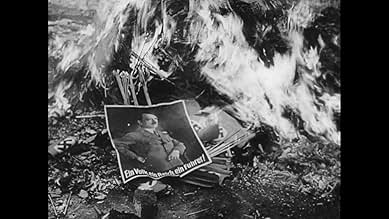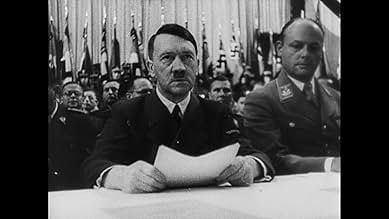Füge eine Handlung in deiner Sprache hinzuThis meticulously assembled film dissects the Third Reich with an analytical blade, charting Hitler's improbable rise, his mastery of crowd psychology and his consummate skill in exploiting ... Alles lesenThis meticulously assembled film dissects the Third Reich with an analytical blade, charting Hitler's improbable rise, his mastery of crowd psychology and his consummate skill in exploiting others' weaknesses.This meticulously assembled film dissects the Third Reich with an analytical blade, charting Hitler's improbable rise, his mastery of crowd psychology and his consummate skill in exploiting others' weaknesses.
- Regie
- Drehbuch
- Hauptbesetzung
- Narrator
- (German version)
- (Synchronisation)
- Narrator of English version
- (Synchronisation)
- Self
- (Archivfilmmaterial)
- Self
- (Archivfilmmaterial)
- Self
- (Archivfilmmaterial)
- Self
- (Archivfilmmaterial)
- (as Dr. Karl Brandt)
- Self
- (Archivfilmmaterial)
- Self
- (Archivfilmmaterial)
- Self
- (Archivfilmmaterial)
- Self
- (Archivfilmmaterial)
- Self
- (Archivfilmmaterial)
- Self
- (Archivfilmmaterial)
- Self
- (Archivfilmmaterial)
- Self
- (Archivfilmmaterial)
- Self
- (Archivfilmmaterial)
- Self
- (Archivfilmmaterial)
- Self
- (Archivfilmmaterial)
Empfohlene Bewertungen
It's probably still the most abundant treasure chest of film and image about the dictator available. We have no talking experts and none of the glossy, samey feel of Netflix documentaries. It's German made and narrated by a Brit - so Hitler is, of course, savaged, often with sardonic wit. The tone is hypnotic.
The biggest sense it covneys is of Hitler as both director of theater and actor on a stage he prepares. In a few marvelous, and previously unseen by me footage, we see not just the vitriolic exposition up on stage - but also the nervous preparation, the uncertainty of the early days. And when deprived of the spotlight, having to sit with others as a more ordinary mortal (such as at Berghof), morose, taciturn, uninteresting.
FDR was a huge contrast. Similarly magnetic when he wanted to, inspiring on a stage, but happier outside of it, gregarious with company and loved a good gossip. He did entertain his own coterie like Hitler, but his home was vivacious, open-hearted.
It paints a good picture of early Hitler in Vienna growing quietly resentful at being ordinary. In a Travis Bickle or Lee Oswald kind of way.
The need was always for a grandiose stage and adulation from a crowd. In later days, confused by unexpected successes (invading through the Ardennes), he thought he was also a strategic genius, to disastrous results for everyone.
His bitterest legacy, the Holocaust, is included near the end, with harrowing footage. WWII footage will be more familiar from other places, by comparison to the early days. And how fitting that post Stalingrad at the latest, there are no more foootage of speeches and crowds and only the well known Hitler who looks shaken and glum.
There are so many riches here; we don't just see Hitler driving triumphant into Vienna for the Anschluss, we also see the speech before an endless crowd welcoming his home country Austria into the empire. Footage from the Blitz we have seen countless times; but I've never before seen footage of German parades in the closing stages of the war, trying to recapture the fervor of early Nazi days but looking ramshackle and foolish amid ruins of a half-destroyed city.
So this is essential viewing to this day, more so for the prewar coverage. WWII changed everything in ways we still do not fully grasp - our world was sped up by maybe 100 years I think. We are picking its lessons apart at our peril. One of the best I've seen.
Divided into three-acts, we first explore Hitler's early life and then his ambitious, angry rise to power beginning as a soldier with the German Army in WWI. The second act features his time in office after his release from prison in 1924; his incendiary speeches and broken treaties; and the rebuilding of the decimated German military while crushing anyone who stands in his way. The act ends with a close-up examination of his strategies and atrocities just before and during WWII. The third act centers on Hitler's life during the last years of the war; the collapse of the Third Reich, his suicide and the Allies' liberation of Germany; and a brief glance at Hitler's scale-model plan of what Berlin would have looked like had he and the Nazi's been successful.
Two things you'll LIKE about this documentary: 1) It's well curated and well edited with tons of footage (mostly black and white); 2) It doesn't glorify Hitler or the Nazi party.
Two things you'll DISLIKE: 1) Although it's broken into parts (or acts), it plays as one long, epic show totaling two hours and thirty minutes (information overload - I watched it over two nights); 2) As the title suggests, it's about Hitler's career, so there is very little information about his life growing up in Austria.
My father was in WWII and because he was almost 46 when I was born I never really became mature enough to talk to him about the whole thing as an adult. Now I wish I could, but of course it's too late. So I read and watch what I can to learn of this unthinkable period in which evil came close to being dominant in our world. If a person unfit to have a real job or raise a family could fool a great country into leading it off a cliff how can the power of evil be underestimated? I've read that over 50 million deaths were directly related to Hitler's actions and subsequent World War. If we are not to repeat the mistakes of the past we must learn from it. I find this a good learning tool. A glimpse into one of the most evil men who ever ruled a people. I'm sorry to say "one of the most" as we still have evil rising to great heights today. We must not forget as civilized God fearing people we still have a mandate to fight that evil.
Wusstest du schon
- Zitate
Narrator of English version: Any man who put his trust in Hitler, could count on his protection. The frightened middle classes, the working man, or the unemployed. His energetic platitudes were directed at everybody.
- VerbindungenFeatures Triumph des Willens (1935)
Top-Auswahl
- How long is Hitler: A Career?Powered by Alexa
Details
- Erscheinungsdatum
- Herkunftsland
- Sprache
- Auch bekannt als
- Hitler: A Career
- Drehorte
- Berlin, Deutschland(Historical Footage)
- Produktionsfirmen
- Weitere beteiligte Unternehmen bei IMDbPro anzeigen
- Laufzeit2 Stunden 30 Minuten
- Farbe
- Sound-Mix
- Seitenverhältnis
- 1.37 : 1
Zu dieser Seite beitragen




